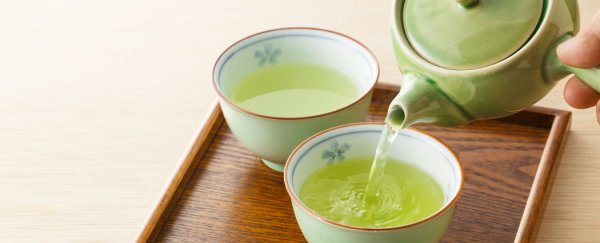Led by Joshua Lambert, associate professor of food science and co-director of Pennsylvania State University's Centre for Plant and Mushroom Foods for Health, researchers have watched as the compound epigallocatechin-3-gallate (EGCG) - the most abundant antioxidant in green tea - triggers a cycle of damage in the mitochondria of cancer cells, which essentially causes them to disintegrate from the inside-out.
"EGCG is doing something to damage the mitochondria and that mitochondrial damage sets up a cycle causing more damage, and it spirals out, until the cell undergoes programmed cell death," says Lambert in a press release. "It looks like EGCG causes the formation of reactive oxygen species in cancer cells, which damages the mitochondria, and the mitochondria responds by making more reactive oxygen species."
These reactive oxygen species - also known as free radicals - are oxygen-containing molecules that, if allowed to accumulate in numbers that overwhelm the cell's antioxidant defence, will cause oxidative stress. If left untreated, oxidative stress can damage all components of the cell, including the proteins, lipids, and DNA, and lead to the development of all kinds of devastating diseases including cancer, Parkinson's and Alzheimer's disease, infections, and chronic fatigue syndrome.
While the cancer cell is undergoing oxidative stress thanks to the green tea compound EGCG, the researchers found that the damage to the mitochondria grows progressively worse. While at the same time, the cell's expression of its antioxidant genes - which are supposed to fight the reactive oxygen species - is reduced. This means the cancer cell is switching off its main defence mechanism while EGCG is further weakening it with oxidative stress.
And curiously, the devastating effects on cancer cells were not seen in normal, healthy cells. Quite the opposite - the researchers found that the compound actually increased what's known as the mitochondrial membrane potential, which is essential for a healthy metabolism within the cell.
The team figured this out by growing normal, healthy cells and oral cancer cells in petri dishes, and then exposing them to EGCG. They say the amount they used was equivalent to how much would end up in your saliva after chewing green-tea gum. The cells were then periodically monitored for oxidative stress and signs of defensive antioxidant response.
Through this process, they identified the protein sirtuin 3 (SIRT3), as playing a crucial role in the process. "It plays an important role in mitochondrial function and in antioxidant response in lots of tissues in the body, so the idea that EGCG might selectively affect the activity of sirtuin 3 in cancer cells - to turn it off - and in normal cells - to turn it on - is probably applicable in multiple kinds of cancers," said Lambert.
While EGCG significantly reduced protein and messenger RNA levels - the molecules that carry DNA codes in the cell's nucleus to sites of protein synthesis - of SIRT3 in oral cancer cells, the researchers found that it had no effect on the SIRT3 expression in normal cells.
The team published their results in the online issue of Molecular Nutrition and Food Research. Lambert says the results tie in to previous findings of separate studied, where green tea compounds have been shown to treat and prevent oral cancer in animal studies.
In 2014, it was estimated that 42,440 new cases and 8,390 deaths from oral cancer will occur in the US this year. Smokers are the most vulnerable group, because tobacco is known to induce genetic changes that irreversibly increase the risk of developing the disease.
The team would now like to do their own studies on animals in the lab, to see if the effects they observed in the petri dishes can be replicated in a living creature.
"The problem with a lot of chemotherapy drugs - especially early chemotherapy drugs - is that they really just target rapidly dividing cells, so cancer divides rapidly, but so do cells in your hair follicles and cells in your intestines, so you have a lot of side effects," said Lambert. "But you don't see these sorts of side effects with green tea consumption."
